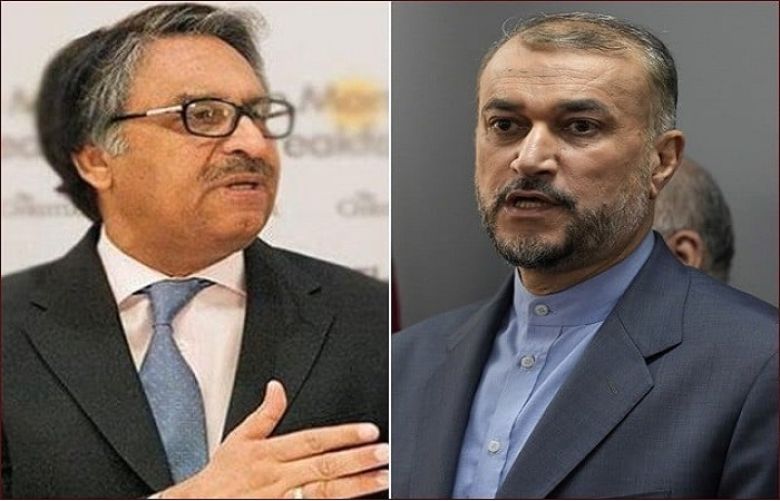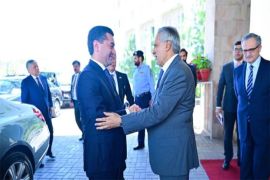In the backdrop of recent tensions between Pakistan and Iran, Foreign Minister Jalil Abbas Jilani on Friday held a telephonic conversation with his Iranian counterpart, Hossein Amir-Abdollahian, and expressed Islamabad’s readiness to work with Tehran on all issues.
On Tuesday, Iran had launched attacks in Pakistan targeting what it described as bases for the militant group Jaish al-Adl in the border town of Panjgur in Balochistan, Iranian state media reported, prompting strong condemnation from Islamabad and downgrading of diplomatic ties.
The Iranian strikes were part of a series of attacks carried out by Iran in recent days in Syria and Iraq as a response to recent terrorist attacks on its territory. They have heightened concerns about regional stability, particularly amid ongoing conflicts in the Middle East.
The next day, Pakistan struck “hideouts used by terrorist organisations namely Balochistan Liberation Army (BLA) and Balochistan Liberation Front (BLF)” in Iran’s Sistan-Baluchestan province, in an intelligence-based operation codenamed ‘Marg Bar Sarmachar’.
Iran’s IRNA news agency had reported that nine people were killed in the attack targeting a village in the city of Saravan, with Iranian Interior Minister Ahmad Vahidi saying all the dead “were foreign nationals”.
Iran had condemned the strikes, and summoned Pakistan’s charge d’affaires “to protest and request an explanation from the Pakistani government,” according to a statement by foreign ministry spokesman Nasser Kanani.
However, the Iranian foreign ministry later said in a press release that it was committed to good neighbourly relations with Pakistan while condemning what it said was an “unbalanced and unacceptable drone attack on non-Iranian villagers”.
Following Pakistan’s tit-for-tat response to Iran’s missile attack, caretaker Prime Minister Anwaarul Haq Kakar, who was in Switzerland for the 54th annual meeting of the World Economic Forum (WEF), decided to cut short his visit.
Similarly, FM Jilani, who was in Uganda to attend a ministerial meeting of the non-aligned movement, also decided to return to the country.
According to a statement issued by the Foreign Office today, the foreign minister spoke to Abdollahian and expressed Pakistan’s readiness to work with Iran on “all issues based on the spirit of mutual trust and cooperation”.
“He underscored the need for closer cooperation on security issues,” the FO added.
The exchange between foreign ministers came as the National Security Committee (NSC) convened for an emergency meeting today.
PM Kakar chaired the high-level moot with all the military services chiefs, including Chief of Army Staff (COAS) Gen Syed Asim Munir, in attendance, a source in the prime minister’s office told Reuters.
Jilani, Turkish counterpart discuss Pak-Iran tensions
Earlier, FM Jilani and his Turkish counterpart, Hakan Fidan, discussed the “ongoing developments between Pakistan and Iran”, the FO said.
The statement said Jilani shared Pakistan’s perspective and the “recent developments”.
“He stated that Pakistan’s Operation ‘Marg Bar Sarmachar’ was aimed at terrorist camps inside Iran and that Pakistan has no interest or desire in escalation,” the statement said.
BLA, BLF hideouts targeted in ‘precision strikes’: ISPR
The ISPR on Thursday had said hideouts used by BLA and BLF were successfully struck in the military operation, adding that “precision strikes were carried out using killer drones, rockets, loitering munitions and stand-off weapons” while maximum care was taken to avoid collateral damage.
“The targeted hideouts were being used by notorious terrorists including Dosta alias Chairman, Bajjar alias Soghat, Sahil alias Shafaq, Asghar alias Basham and Wazir alias Wazi, amongst others,” it said.
“Pakistan Armed Forces remain in a perpetual state of readiness to ensure the safety of Pakistan citizens against acts of terrorism,” the army’s media wing stated.
“Our resolve to ensure that the sovereignty and territorial integrity of Pakistan is respected and safeguarded against any misadventure, remains unwavering. We reaffirm our determination to defeat all enemies of Pakistan with the support of the people of Pakistan,” it said.
The map shows the location of Iran’s Sistan-Baluchestan province bordering Pakistan. — AFP
The ISPR added that “dialogue and cooperation” was deemed prudent in resolving bilateral issues between the two brotherly countries.
Initially, IRNA reported three women and four children were killed in blasts. It later updated the death toll to nine.
“Two men were also killed in the missile attack this morning in one of the border villages of Saravan, bringing the death toll to nine,” the news agency said quoting Alireza Marhamati, deputy provincial governor of the Sistan-Baluchestan province.
Strikes’ ‘sole objective’ Pakistan’s security: FO
The Foreign Office had said Pakistan undertook a series of “highly coordinated and specifically targeted precision military strikes” against terrorist hideouts in Iran’s Sistan-Baluchestan province.
“Over the last several years, in our engagements with Iran, Pakistan has consistently shared its serious concerns about the safe havens and sanctuaries enjoyed by Pakistani origin terrorists calling themselves Sarmachars on the ungoverned spaces inside Iran. Pakistan also shared multiple dossiers with concrete evidence of the presence and activities of these terrorists,” it said in a statement.
“However, because of lack of action on our serious concerns, these so-called Sarmachars continued to spill the blood of innocent Pakistanis with impunity. This morning’s action was taken in light of credible intelligence of impending large-scale terrorist activities by these so-called Sarmachars.
The image shows smoke billowing in Iran’s southeastern province of Sistan-Baluchestan on January 18. — Photo courtesy IRNA news agency
“Pakistan will continue to take all necessary steps to preserve the safety and security of its people which is sacrosanct, inviolable and sacred,” said FO.
The statement stressed that Pakistan “fully respects the sovereignty and territorial integrity of the Islamic Republic of Iran”, adding “the sole objective of today’s act was in pursuit of Pakistan’s own security and national interest which is paramount and cannot be compromised”.
“As a responsible member of the international community, Pakistan upholds the principles and purposes of the UN Charter including territorial integrity and sovereignty of member states. Guided by these principles, and in exercise of our legitimate rights within international law, Pakistan will never allow its sovereignty and territorial integrity to be challenged, under any pretext or circumstances.
“Iran is a brotherly country and the people of Pakistan have great respect and affection for the Iranian people. We have always emphasised dialogue and cooperation in confronting common challenges including the menace of terrorism and will continue to endeavour to find joint solutions,” it concluded.







